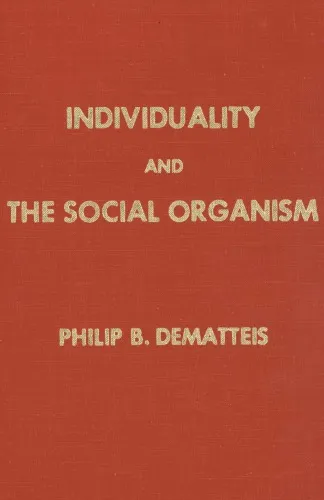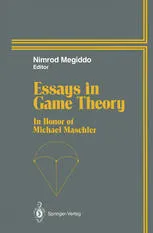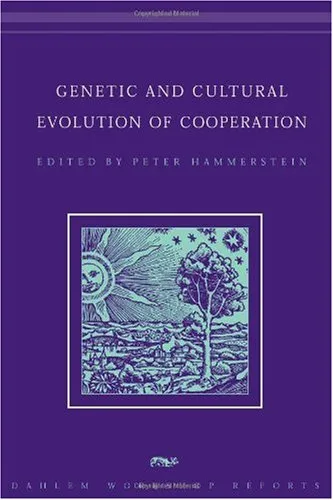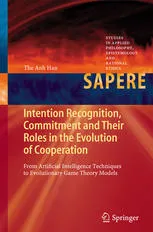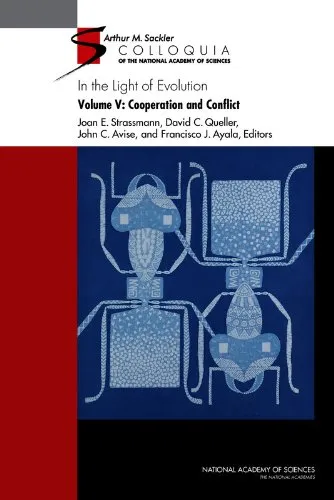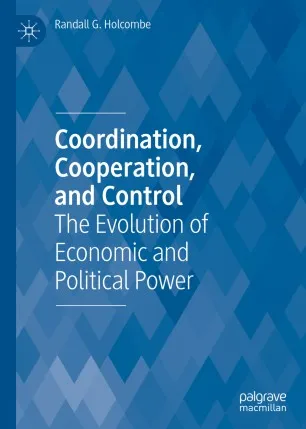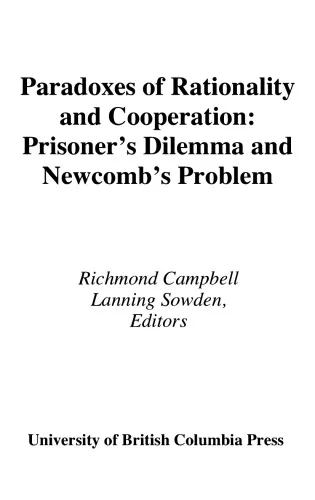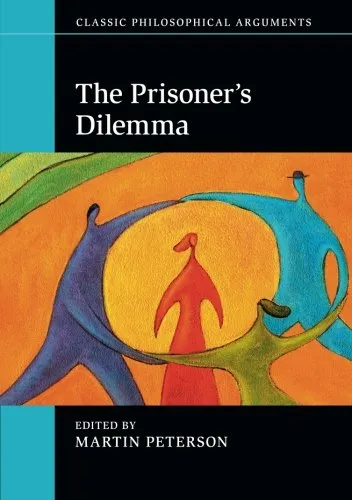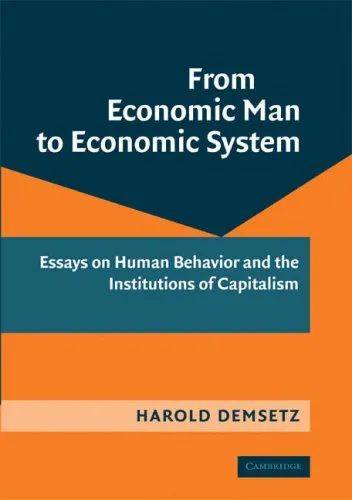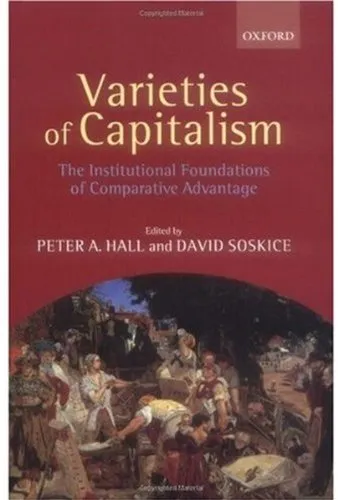Ideology and the Evolution of Vital Institutions: Guilds, The Gold Standard, and Modern International Cooperation
4.5
بر اساس نظر کاربران

شما میتونید سوالاتتون در باره کتاب رو از هوش مصنوعیش بعد از ورود بپرسید
هر دانلود یا پرسش از هوش مصنوعی 2 امتیاز لازم دارد، برای بدست آوردن امتیاز رایگان، به صفحه ی راهنمای امتیازات سر بزنید و یک سری کار ارزشمند انجام بدینکتاب های مرتبط:
معرفی کتاب
کتاب "Ideology and the Evolution of Vital Institutions: Guilds, The Gold Standard, and Modern International Cooperation" اثری پژوهشی است که به بررسی تأثیر ایدئولوژی بر تحولات نهادهای اجتماعی و اقتصادی میپردازد. این کتاب به خواننده کمک میکند تا درک عمیقی از نقش سازمانهای صنفی (Guilds)، نظام استاندارد طلا (Gold Standard)، و همکاریهای بینالمللی مدرن ایجاد کند. نویسندگان، با ارائه دیدگاهی تازه از تاریخچه این نهادهای کلیدی، به روابط پیچیده میان ایدئولوژی و توسعه اقتصادی و اجتماعی میپردازند.
خلاصهای از کتاب
در این کتاب، نویسندگان تلاش میکنند تا نشان دهند که چگونه ایدئولوژی بر روند شکلگیری و تکامل نهادهایی تأثیر گذاشته است که برای پایداری اقتصادی و سیاسی جوامع ضروری هستند. این اثر در سه بخش اصلی تدوین شده است:
- Guilds: تحلیلی دقیق از شکلگیری و تأثیر سازمانهای صنفی در ارتقای تجارت، پشتیبانی از مصرفکنندگان، و تنظیم مقررات اقتصادی.
- Gold Standard: بررسی مزایا و معایب نظام استاندارد طلا در ثباتبخشی به ارزش پول و تجارت بینالمللی، همچنین تأثیرات آن بر بحرانهای اقتصادی جهانی.
- Modern International Cooperation: نقش همکاریهای بینالمللی در مقابله با چالشهای معاصر مانند تغییرات اقلیمی، تجارت جهانی، و صلح بینالمللی.
نویسندگان با بهرهگیری از روشهای تحلیلی و تاریخی، مسیر تکاملی این نهادها را مورد بررسی قرار میدهند و نشان میدهند که چگونه ایدئولوژیها و باورهای فرهنگی گاهی به تسریع رشد و گاهی به مانعی برای پیشرفت تبدیل میشوند.
نکات کلیدی
- نقش محوری ایدئولوژی در طراحی، پذیرش، و اصلاح نهادهای اقتصادی و اجتماعی.
- اهمیت Guilds در حفظ توازن بین منافع فردی و رفاه عمومی در تمدنهای گذشته.
- کشف تأثیر مثبت و منفی Gold Standard بر اقتصادهای ملی و جهانی.
- ارزیابی موفقیتها و محدودیتهای همکاری بینالمللی در دنیای مدرن.
- تأکید بر اهمیت اصلاح نهادهای موجود جهت مواجهه با چالشهای پیشرو.
جملات معروف از کتاب
“Institutions are the vital organs of society, and their evolution is a reflection of the collective ideologies of communities.”
“The collapse of the Gold Standard wasn't just a financial event; it was a crisis of trust in the very framework of international cooperation.”
“History shows us that when ideologies stagnate, so do the institutions that uphold society.”
چرا این کتاب اهمیت دارد؟
این کتاب برای پژوهشگران علوم انسانی و اجتماعی، علاقمندان به تاریخ اقتصادی، و سیاستگذاران بسیار ارزشمند است. با توجه به پیچیدگیهای جهان مدرن، از نقش نهادها در مدیریت اقتصاد جهانی تا تأثیر همکاریهای بینالمللی بر بحرانهای جهانی، مطالعه این کتاب میتواند بینشهای عملی و نظری منحصربفردی ارائه دهد. همچنین این کتاب ابزاری مفید برای درک بهتر این موضوع است که چطور ایدئولوژیها راهبردهای توسعه بلندمدت را شکل میدهند.
Introduction to "Ideology and the Evolution of Vital Institutions"
Ideology and the Evolution of Vital Institutions: Guilds, The Gold Standard, and Modern International Cooperation explores the intricate interplay between ideological paradigms and the formation, evolution, and eventual obsolescence of crucial societal institutions. Written with depth and clarity, the book offers a comprehensive investigation into how historical and modern institutions evolve in response to changing sociopolitical ideologies and the economic pressures underpinning them.
This book provides readers with an engaging exploration of economic history and institutional development by focusing on three pivotal systems: medieval guilds, the gold standard, and modern international cooperation mechanisms like those embodied by global organizations. Each of these institutions is carefully unpacked, examined for its ideological origins, and analyzed within its historical context to better understand its evolution and eventual demise or transformation. By delving deep into these case studies, the book provides a compelling commentary on how human thought and collective action shape the world around us.
With a multidisciplinary approach, Ideology and the Evolution of Vital Institutions masterfully blends insights from economics, political science, history, and sociology. Whether you're an academic, a policymaker, or a curious reader looking to better understand the forces shaping critical societal structures, this book is a valuable resource for exploring the complex dynamics of ideology and institutional development.
Detailed Summary
At its heart, the book focuses on three critical systems: guilds in the medieval period, the gold standard of the modern era, and international cooperation mechanisms that shape present-day global governance. Each institution is treated as an example of how ideologies not only inspire their foundation but also constrain their operations and influence their eventual decline:
- Medieval Guilds: These organizations are presented as the cornerstone of medieval economic and social life. By regulating wages, apprenticeship, and production, guilds showcased how collectivist ideologies serve to protect individual members and preserve group privileges. The book examines the ideological shifts that eroded guilds' dominance, allowing market capitalism to emerge.
- The Gold Standard: As a paragon of monetary discipline, the gold standard embodied ideological commitments to stability and trust in financial transactions. The narrative traces the rise of the gold standard, its global proliferation, and the ideological conflicts that ultimately led to its abandonment during the 20th century’s Great Depression and wartime inflationary pressures.
- Modern International Cooperation: Finally, the book explores institutions like the United Nations, World Trade Organization, and others, highlighting how ideological convergence on globalism and mutual interdependence has fostered frameworks for cooperation. At the same time, the book critically addresses instances where ideological rifts hinder global progress and the challenges these frameworks face in maintaining relevance.
These case studies collectively provide an insightful commentary on the ideological tenets behind institutional developments while offering a broader understanding of the connection between institutional evolution and historical change.
Key Takeaways
- Ideology plays a central role in shaping institutions, influencing their creation, operations, and ultimate demise.
- Institutions evolve in response to changes in sociopolitical and economic conditions, but they are often bound by the ideological premises of their origins.
- The collapse of outdated institutions can pave the way for new systems better aligned with contemporary ideological and economic realities.
- Understanding the historical trajectory of institutions can help policymakers design more resilient structures for future challenges.
Famous Quotes from the Book
"Ideology, whether rigid or flexible, serves as the scaffolding upon which human institutions are erected—and simultaneously, the chains which constrain their evolution."
"History teaches us that institutional obsolescence is rarely about inefficiency but rather a failure to adapt to new ideological demands."
"The strength of an institution lies not just in its design but in its ability to transcend the ideological limitations of its founding."
Why This Book Matters
In an age where institutions face increasing scrutiny and rigid ideologies prompt polarized global debates, this book sheds light on the nuances of institutional endurance. It is a testament to the power of collective human thought, showing how ideology shapes the institutions we depend upon for societal, economic, and political stability.
Scholars, policymakers, and curious readers alike will find the insights of Ideology and the Evolution of Vital Institutions invaluable for understanding the cyclical nature of institutional life. Its lessons encourage readers to consider the ideological roots of today’s systems and question whether these structures are adaptable enough to meet future challenges. By doing so, the book equips its audience with the philosophical and historical tools necessary to contribute toward creating robust and equitable institutions for the modern era.
دانلود رایگان مستقیم
شما میتونید سوالاتتون در باره کتاب رو از هوش مصنوعیش بعد از ورود بپرسید
دسترسی به کتابها از طریق پلتفرمهای قانونی و کتابخانههای عمومی نه تنها از حقوق نویسندگان و ناشران حمایت میکند، بلکه به پایداری فرهنگ کتابخوانی نیز کمک میرساند. پیش از دانلود، لحظهای به بررسی این گزینهها فکر کنید.
این کتاب رو در پلتفرم های دیگه ببینید
WorldCat به شما کمک میکنه تا کتاب ها رو در کتابخانه های سراسر دنیا پیدا کنید
امتیازها، نظرات تخصصی و صحبت ها درباره کتاب را در Goodreads ببینید
کتابهای کمیاب یا دست دوم را در AbeBooks پیدا کنید و بخرید
1309
بازدید4.5
امتیاز0
نظر98%
رضایتنظرات:
4.5
بر اساس 0 نظر کاربران
Questions & Answers
Ask questions about this book or help others by answering
No questions yet. Be the first to ask!


